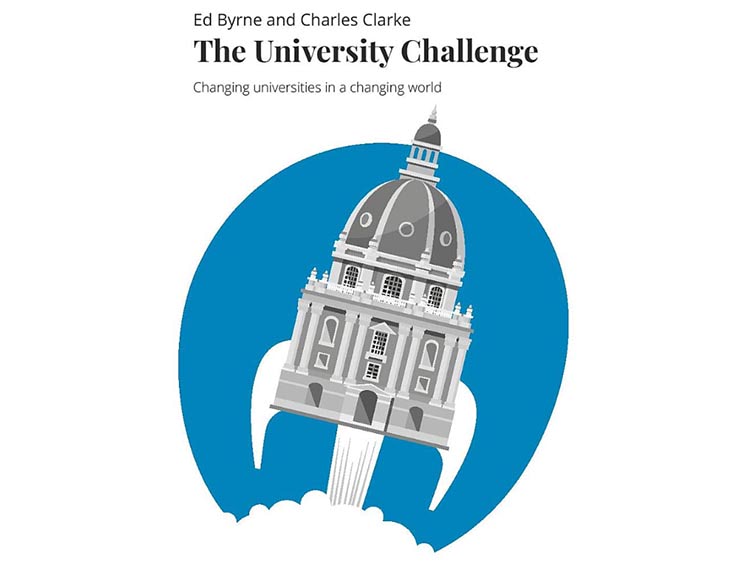UNIVERSITIES MUST PLAY THE LEADING ROLE IN A CHANGING WORLD

The #UniversityChallenge provides the blueprint for universities to remain relevant and lead the modern world
Change is everywhere. It’s happening at lightning speed on all fronts – environmentally, technologically and politically. We need to understand and address the implications of that change in order to avoid unintended consequences
The digital revolution has already altered the way we shop, access knowledge and consume facts and we haven’t yet caught up with the implications this has had on civil society and our daily lives – from our inability to spot fake news to our ailing high streets
Advances in digital technology and AI are set to radically reshape the world of work and we need urgent answers to how to enable people to continue to live worthwhile and fulfilled lives as jobs change and the working week shrinks. And then there’s the looming environmental crisis and the need for creative responses to the way the planet is changing
The University Challenge – Changing Universities in a Changing World, a new book from top educational policy leaders the Rt Hon Charles Clarke and Prof. Ed Byrne, shows how universities need to change in a wide variety of ways if they are to play the role that they should, in helping economies and societies adapt and respond.
Written by former Education Secretary, the Rt Hon Charles Clarke and the Principal of Kings College London, Prof. Ed Byrne, this important new book shows how our universities can – and must – evolve to lead our thinking on the major issues of the day and identify solutions and suggest a way forward.
Throughout history, universities have played a leading role in shaping both our understanding of the world and our response to it. From Galileo to Crick to Gates and Zuckerberg, the ideas emerging from universities have created seismic shifts in the way we live and interact with the world.
Mankind faces enormous challenges in the decades ahead. From climate change, the need to feed the world’s growing population and care for an aging population, through to the rollout of AI, we need joined-up thinking and creative ideas to find solutions. In short, we need universities to lead from the front. Aligning the work that they do with the most pressing issues the world faces.
Exploring the vital contributions universities make in helping the world deal with accelerating change and the challenges that change creates, this book shows how universities can and should transform and change to meet that role even better, providing a blueprint for them to develop their offering on four key fronts:
- Understanding and interpreting the process of change
- Offering approaches that would harness the process of change for general benefit
- Educating and training to high quality the specialist workers whose skills are necessary to address change properly
- Creating a general intellectually engaging climate and culture across societies that promotes the virtues of understanding and science.
The book takes an in-depth look at each of these pillars with chapters exploring the need for universities to adapt to the changing shape of careers and work. The need to encourage and fund ‘research universities’, as well as in-depth analysis of the issues around access, funding and governance.
The University Challenge – Changing Universities in a Changing World, shows the vital role universities must play in making this complex and changing world a better place. This is their mission and their challenge, and if universities are to remain true to this higher purpose, they must also find a higher gear. Ed Byrne and Charles Clarke show how transforming universities can change the world.
Edward Byrne is an academic neurologist who established his research career in the neuromuscular field. He was Professor of Neurology and Director of the Centre for Neuroscience at the University of Melbourne, and then had a number of leadership positions in health and in the university world including Dean of Medicine, Nursing and Health Sciences at Monash University, Vice-Provost for Health at UCL and Vice-Chancellor of Monash University. He is now the President and Principal at King’s College London. He is currently the Chairman of the Association of Commonwealth Universities.
Charles Clarke is a Labour Party politician who served as Education Secretary and then Home Secretary. As Education Secretary, he encouraged the establishment of specialist secondary schools, established the national network of Sector Skills Councils and led the process of university reform, including introducing the legislation which enabled universities to charge tuition fees, repayable after graduation. He works on international education reform for parts of Cambridge University and has held Visiting Professorships at the Universities of East Anglia, Lancaster and King’s College London.
In an exclusive interview for #SkillsWorld the podcast, Charles Clarke, former secretary of state for education spoke to Tom Bewick about his time as a cabinet minister in Tony Blair’s government, and reveals where the 50% HE participation target really came from:












Responses